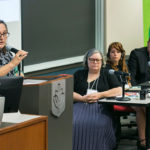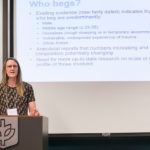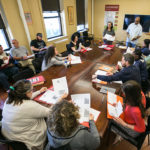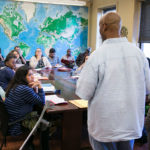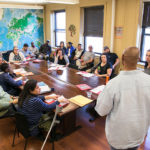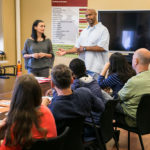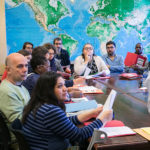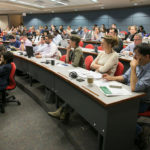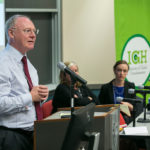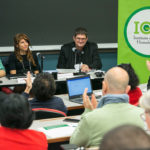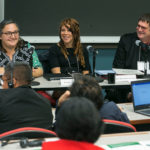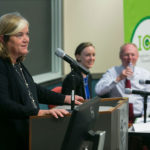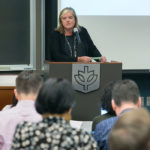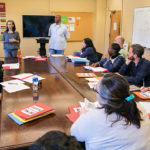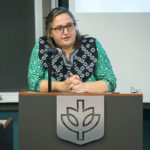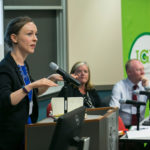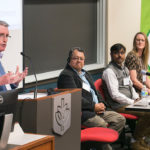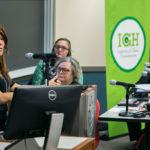Ending Street Homelessness In Your City
2017 | Chicago, USA
Ending Street Homelessness in Your City, IGH’s second biennial conference, brought together 115 thought leaders from 30 countries and touched on what it means to end street homelessness, how to measure progress, and how to solve some of the most complicated challenges cities face in meeting this goal. To those who attended, thank you for your contributions. To those who were unable to join us, we hope the resources available here will help you feel like you were there!
For access to video, powerpoints and other resources from conference presenters, navigate to “resources” on the menu above. To get an informal sense of the energy and flow of the conference, see our Storify and blog post.
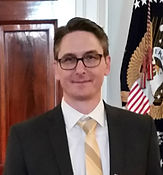
Tom Albanese, L.S.W.
Defining an end to homelessness
Tom Albanese serves as the Associate Director of Community Shelter Board (CSB) and has provided planning, development, and implementation support for housing and homelessness programs since 1992. Established in 1986, CSB is a collective impact organization leading the response to homelessness in Columbus and Franklin County, Ohio, by creating collaborations, developing innovative solutions, and investing in quality programs. As CSB’s Associate Director, Tom is responsible for overall strategic planning, program leadership and management, external relationships, and knowledge management.
Previously, Tom served as a Principal Associate with Abt Associates, where he led national technical assistance efforts for the U.S. Department of Veterans Affairs Supportive Services for Veteran Families (SSVF) program and for the U.S. Department of Housing and Urban Development (HUD) Priority Communities, Vets@Home, and other initiatives. Tom has assisted a variety of states and localities with developing and improving homelessness crisis response systems, including serving as HUD’s lead technical assistance provider on homelessness assistance for New York City and the state of California, among other communities. Prior to Abt, Tom served as Director of Programs and Planning for CSB and as Associate Director for Family & Community Services, Inc., in Northeast Ohio. He has managed both rural and urban Continuums of Care and served as director of homelessness prevention, emergency shelter, and transitional housing programs. Tom is a Licensed Social Worker in the state of Ohio.

Jason Albertson
Strategies to address encampments
Jason Albertson, LCSW began his current assignment with the Department of Homelessness and Supportive Housing on July 18th of 2016. He has been working in the communities of poverty, homelessness, substance abuse, mental illness and HIV in San Francisco since 1991. Starting in shelters, he followed his clients indoors and spent 8 years working in supportive housing for single adults and small families experiencing homelessness, before returning to school for a Masters degree at the University of California, Berkeley. He returned to service in San Francisco, working in an innovative outreach program designed to serve people experiencing homelessness with severe mental illness in a recovery and clubhouse model, before moving to work for the San Francisco Homeless Outreach Team as a clinician and team leader. He provided services as part of a psychiatric emergency response team, a partnership project coupling behavioral health responders with law enforcement in an adjacent county, before returning to San Francisco to manage the Encampment Resolution Team’s effort to assist encamped individuals and groups to places of safety.
Since the team began operations, 7 encampments of 30 persons or more have been resolved, with 277 persons assisted to places of safety. More than 200 persons have been tested in the course of resolution efforts for HIV, hepatitis C, syphilis, gonorrhea and other illnesses. Pre-Exposure Prophylaxis (P.R.E.P) has been offered, as has Post Exposure Prophylaxis, for individuals at risk of acquiring HIV/AIDS. Encampment health (EH) has been developed as a public health effort to address the health care needs of individuals living in encampments is underway.

Isobel Ashford
Solutions Showcase
Isobel joined the Building and Social Housing Foundation (BSHF) as Head of Communications in 2012 and became Deputy Director in 2015. She oversees the development and delivery of BSHF’s programs, which are designed to identify and support the scaling and transfer of great housing practice around the world. These include the World Habitat Awards and related Knowledge Exchange activities, as well as the organization’s development program on Community-Led Housing and the European End Street Homelessness Campaign. Prior to joining BSHF, Isobel held management posts in marketing and communications within the public and not-for-profit sectors. Her first career, on leaving university, was as a teacher of English as a Second/Foreign Language, which saw her working in the U.K. and Italy before spending seven years in the Spanish Basque Country.
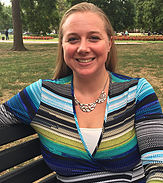
Samantha Batko
Strategies to address encampments
Samantha Batko, Director of the Homelessness Research Institute, leads the research arm of the National Alliance to End Homelessness. In that role, she monitors trends in homelessness, homeless assistance, and at-risk populations; identifies and promotes promising local practices; and translates research to improve homelessness policy and practice. Ms. Batko also serves as the co-chair of the Alliance’s Research Council. Prior to this position, Ms. Batko focused on crafting policy and identifying promising programs that end homelessness for unaccompanied youth and young parents as a member of the Alliance’s policy team. She also served as the Alliance’s lead staff person on issues affecting survivors of domestic violence. She has previous experience helping state and local governments, communities, and nonprofits design and implement rapid re-housing/Housing First systems and programs. Ms. Batko joined the Alliance in February 2006 after graduating from Virginia Tech with a B.S. in Psychology.

Kristen Berlacher
Solutions Showcase
As senior program manager of Social Impact & Philanthropy at Airbnb, Kristen oversees strategic partnerships, global volunteerism and social good product integration. Since 2015, she’s focused on providing free housing on Airbnb for people in need and most recently formed a partnership with the San Francisco Giants to raise funds and awareness for the Heading Home campaign – an initiative led by Hamilton Families, the city of San Francisco and SF Unified School District to end family homelessness by 2020.
From 2010 to 2014, Kristen led Hyatt’s global community engagement programs – focused on disaster response, international grant-making and employee volunteerism – and launched a national effort to teach underserved high school students about careers in hospitality.
Before Hyatt, Kristen served as interim Executive Director for Working in the Schools – a nonprofit that provides tutoring and mentoring to at-risk youth in Chicago Public Schools – where she oversaw program development, digital marketing, fundraising, and strategic planning.

Ian Brady
Strategies to address encampments
Ian Brady has been Chief Operations Officer for Depaul International for the past 18 months. Before joining Depaul, Ian was a senior civil servant working on a number of national programs for the U.K. Government. Appointed in 1997 as an advisor on homelessness, he led the extension of the Rough Sleepers Initiative across England. He then joined the Rough Sleepers Unit and headed up the Delivery team, charged with reducing rough sleeping across England and Wales by two thirds. Following the achievement of this target, he then joined the newly established Homelessness Directorate as Deputy Director.
Ian then went on to be Deputy Director of the Government’s Respect Taskforce. As part of this work, he led on the Government’s response to reducing begging and street drinking. His final post in the civil service was to head up the Delivery Team for the Troubled Families Team, charged with turning round the lives of 120,000 troubled families across England. Prior to joining the civil service, Ian worked for the youth homelessness charity Centrepoint for 14 years. He was Head of Services and then Deputy Director for 8 years.
Ian is a qualified Youth and Community worker.

Nonie Brennan
Using measurement and data to end homelessness; Plenary: Ending Homelessness in Chicago
Nonie Brennan is the Chief Executive Officer of All Chicago Making Homelessness History. A visionary leader, Brennan utilizes a mission-focused approach to take organizations to the next level. Her outstanding track record includes strengthening organizations, navigating organization mergers, increasing fund revenue, and building effective collaborations. Her accomplishments include bringing all homelessness prevention funding under one roof to more effectively meet the needs of Chicagoans with unstable housing. She also co-founded the Homelessness Prevention Call Center to streamline homeless services in Chicago.
Under Brennan’s leadership, All Chicago Making Homelessness History distributes $2 million annually in financial assistance for basic needs like rent and utilities; secures, administers, and monitors $70 million in government funding for Chicago’s homeless services annually; and implements Chicago’s Plan 2.0 – A Home for Everyone, in partnership with Chicago’s Department of Family and Support Services.
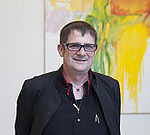
Volker Busch-Geertsema
Using measurement and data to end homelessness; Migration and homelessness
Volker Busch-Geertsema is a Professor and senior research fellow at the Association for Innovative Social Research and Social Planning (GISS, Bremen, Germany). He has been a member of the European Observatory on Homelessness since 1995. He has also been the Coordinator of the Observatory and a member of the editorial team of the European Journal of Homelessness since 2009. He has conducted a large number of extensive research projects on different aspects of homelessness and housing exclusion (including definition and measurement) in Germany and Europe.
Between 2011 and 2013, he coordinated the “Housing First Europe” project funded by the European Commission. For the Institute of Global Homelessness (IGH), he has worked with Suzanne Fitzpatrick and Dennis Culhane on a proposed global typology of homelessness, as well as reflections on measurement of homelessness on a global scale, as a member of our Steering Committee.
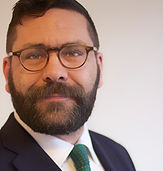
Lee Buss
Solutions Showcase
Lee Buss is currently the Director of Operations and Deputy CEO of Evolve Housing + Support – a leading London based homelessness and community charity. Recently, he has been leading on the delivery of the ‘European End Street Homelessness’ campaign in Croydon – a large South London Borough.
From serving in the Armed forces, through nursing, and into supported housing, Lee’s career to this date has had a very distinct element of serving, protecting and trying to improve communities.
He has worked in the supported housing field for almost 20 years, covering a wide range of housing provision and client groups. The thread that binds them all is that they are the most vulnerable people living within our communities, often shunned and discriminated by those communities but, who have the potential to contribute positively if given the support and assistance to make positive life choices.
Dennis Culhane
Counting homelessness across contexts
Dennis Culhane is the Dana and Andrew Stone Professor of Social Policy at the School of Social Policy and Practice at The University of Pennsylvania, a Senior Research Associate at the Center for Population Studies, and the Director of Research for the National Center on Homelessness among Veterans at the United States Department of Veterans Affairs.
Culhane is a nationally recognized social science researcher with primary expertise in the field of homelessness. He is a leader in the integration of administrative data for research and directs the Actionable Intelligence for Social Policy initiative, a MacArthur-funded project to promote the development of integrated database systems by state and local governments for policy analysis and systems reform.

Suzanne Fitzpatrick
Defining an end to homelessness; Legal and enforcement issues
Suzanne Fitzpatrick completed her PhD on youth homelessness at the University of Glasgow in 1998. She subsequently held a number of posts in the Department of Urban Studies at the University of Glasgow, including ESRC Research Fellow in Housing and Social Exclusion and, latterly, Lecturer in Housing and Social Policy.
From 2003 to 2010 Suzanne was Joseph Rowntree Professor of Housing Policy and Director of the Centre for Housing Policy at the University of York. Suzanne took up her Research Professorship in Housing and Social Policy at Heriot-Watt University in July 2010. Suzanne specializes in research on homelessness and housing exclusion, and much of her work has an international comparative dimension. Suzanne was until recently Editor of the International Journal of Housing Policy.

Rosanne Haggerty
Keynote Speakers
Rosanne Haggerty is the founder and president of Community Solutions, a pioneer in the development of community strategies to end homelessness and improve human service systems. Community Solutions helps communities develop systems-based approaches that optimize local resources to end homelessness. They also assist high poverty neighborhoods in reducing residents’ vulnerability to homelessness.
Community Solutions’ innovations include the 100,000 Homes Campaign – a national, movement-based effort to improve local housing systems – as well a group of neighborhood-based efforts in high poverty communities, aimed at reducing vulnerability to homelessness and persistent poverty in the most challenged areas of the country. The organization’s work uses data, technology and practices drawn from design, quality improvement and public health to produce lasting, humane and cost effective solutions to long-standing conditions of social inequity.
Haggerty’s work has transformed beliefs about homelessness in the U.S. and internationally and has changed the way hundreds of communities respond to homelessness and extreme poverty. Prior to founding Community Solutions, Haggerty founded Common Ground in 1991 to develop innovative housing models to meet the needs of homeless and low-income households in New York City.
Rosanne Haggerty holds a B.A. from Amherst College and an M.S. from Columbia University.

Luis Enrique Hernándezy
Begging and panhandling
Luis is a founding partner and Director of El Caracol AC, an organization dedicated to the attention of street populations from a rights and gender perspective. He has been a speaker at the national and international level on the subject of street populations, working methodologies and institutional strengthening with a human rights approach. In addition, Luis has been part of the teaching staff of the University Diploma Intervention educational with street populations coordinated by the Faculty of Psychology of UNAM and El Caracol AC
From 2008 and 2009 he participated in the consultancy process “Institutional strengthening with a human rights approach” with the San Juan Bosco Center in Honduras, basic ecclesial communities in Nicaragua and APEDIBIMI in Guatemala. He has been apart of advocacy with the groups of street population and a petitioner and collaborator in the investigation and documentation of different human rights issues, issuing five recommendations to different instances of the government of Mexico City.

Heather Holst
Solutions Showcase
Heather Holst is Deputy CEO of Launch Housing and has worked in the housing sector since 1989. Launch Housing is the merge of HomeGround and Hanover that took effect in July 2015, up to which point Heather was CEO at HomeGround. Heather has a History Ph.D. from the University of Melbourne. She has published scholarly articles and a book, Making a Home: A History of Castlemaine. She lectured in history for several years, including in the Clemente program for people who have been experiencing homelessness.
Heather’s housing experience spans homelessness service delivery, tenant advice, policy, program development, research and service coordination in both the non-profit sector and government since 1989. Heather has contributed to key Victorian housing and homelessness innovations, including as co-author of Opening Doors and designer of HomeGround Real Estate.

Martin Houghton-Brown
Is your local community the answer to ending hidden homelessness? The Nightstop model of addressing hidden homelessness in the UK
Martin is Chief Executive of Depaul U.K., which is part of Depaul International – a worldwide family of charities that works with people who are experiencing homelessness. Depaul works to support people who are experiencing homelessness and who are marginalized around the world – in the U.K., France, Ireland, Slovakia, Ukraine, Croatia and U.S.A. Depaul in the U.K. – alongside its programs of supported accommodation, family, prisons and education work leads the international Nightstop.
Previously, Martin was Chief Executive of Missing People, a charity that provides support for missing and runaway children and vulnerable adults and their families. Prior to that, he was Deputy Director at The Children’s Society, where he authored the ground-breaking report ‘Stepping Up’, which generated the U.K. Government’s Young Runaways Action Plan. He became Trustee of YMCA England in 2011 and a YMCA Europe Executive member in 2016. He is now Chair of the National Council of YMCA’s for England and Wales. He has also been a School Governor and is a Fellow of the RSA.

Sarah Johnsen
Legal and enforcement issues; Begging and panhandling
Professor Sarah Johnsen is a Professorial Fellow in the Institute for Social Policy, Housing and Equalities Research (I-SPHERE) at Heriot-Watt University in Edinburgh (U.K.). She has previously worked for Queen Mary University of London, the University of York, and The Salvation Army (U.K. & Ireland). Much of Sarah’s work focuses on homelessness and related forms of ‘street culture’ activity, such as begging and street drinking. She has particular expertise in welfare provision for people experiencing homelessness with complex support needs and in the effectiveness of policy responses that involve elements of ‘social control’. Sarah also has a longstanding interest in the role of faith based organizations in the provision of services for people experiencing homelessness, and in the practice and ethics of research involving vulnerable people.
Jeff Kositsky
Strategies to address encampments
On May 11, 2016, Mayor Edwin M. Lee of San Francisco announced the establishment of the Department of Homelessness & Supportive Housing and appointed Hamilton Family Center Executive Director Jeff Kositsky to lead the new department that will help residents experiencing homelessness permanently exit the streets and move into housing and receive services.
Jeff Kositsky is a nationally recognized leader in innovative homelessness services and has over 20 years of experience managing nonprofit organizations in San Francisco. From 2013, he served as the Executive Director of the Hamilton Family Center. During his tenure, the organization expanded its rapid re‐housing program and developed an innovative partnership with the San Francisco Unified School District to prevent and end homelessness among school children and their families. From 2001 to 2010, he was Executive Director of Community Housing Partnership – a nonprofit affordable housing developer in San Francisco. He has served on several nonprofit boards, including San Francisco’s Coalition on Homelessness and the Treasure Island Development Authority Board of Directors. Mr. Kositsky holds a Bachelor’s degree in Economics and International Relations from American University in Washington, D.C. and a Master’s degree in Public Affairs from the University of Texas.
Sanjay Kumar
Begging and panhandling
Sanjay is apart of an organization called Aashray Adhikar Abhiyan. He is a practitioner, researcher and academician. He has been working in the field of social work, development and social policy since the year 2002 on the issues of homelessness, urban poverty, street and working children, old age pension, right to education and food, and citizenship rights/entitlements. He is managing and implementing a campaign with hundreds of volunteers to ensure access to shelter, health-care, justice – with special reference to the Bombay Prevention of Bagging Act-1959, mobilization, capacity and skill-building programs for people experiencing homelessness. He also takes part in organizing mass events/rallies, conducting census/surveys, documenting and researching interventions, and fostering networks and advocacy with the government’s departments, NGOs, and movements. Ultimately, his work is sensitizing civil society for the realization of the larger goal of people experiencing homelessness and building bridges between global professionals, researchers, and business and political leaders to local communities at grassroots level.
Isabel Lacalle
Counting homelessness across context
Isabel LaCalle Pons is a social worker and Executive Director of Corporación Nuestra Casa, a non-profit organization located in Santiago, Chile since 2010. She has been working for 15 years to overcome the social exclusion that the homeless suffer. As a leader of the Red Calle movement, she brings together the NGO’s working with homeless to have a common voice and influence public policies at the state level. She is part of the founding team at CalleLink. Last year, she led the training for the Winter Program throughout the country.
A dedicated advocate, she seeks to help overcome poverty and improve the lives of those in the most vulnerable positions. She believes in the capabilities of the people and that it is possible to build a fairer, more inclusive society. Her work seeks to provide equal opportunities and help establish and unprejudiced society that believes in and empowers its citizens.

Jessica Marcus
Optional lunchtime workshop: Using real-time data
Jessica Marcus is the Deputy Director of Data and Performance Management for Built for Zero – an effort led by Community Solutions to support 70 communities in ending veteran and chronic homelessness. Her work has focused on incorporating Quality Improvement methodology, database infrastructure development, systems design, and data visualizations to enhance communities’ ability to track their progress and, ultimately, house more people more quickly. Prior to Built for Zero, Jessica was a member of the data and performance management team on the 100,000 Homes Campaign – an effort to help 188 communities house 100,000 vulnerable individuals experiencing chronic homelessness between 2010-2014. She holds a B.A. in Political Science from Northwestern University.
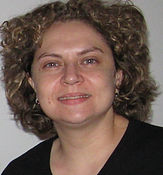
Griselda Palleres
IGH Global Framework of Homelessness in Argentina, Brazil, and Puerto Rico
Griselda Palleres is an Anthropologist with a PhD in Social Sciences at the Universidad de Buenos Aires, Argentina. For more than 17 years, she has carried out fieldwork linked with homelessness in the city of Buenos Aires with governmental and civil society organizations. Her research focuses on the rights of people experiencing homelessness and collective actions deriving from the particular situation of homelessness in the city of Buenos Aires. She has published several articles and edited two books about this social problem. In recent years, in collaboration with a social organization of people experiencing street homelessness, she has worked on the treatment of the first municipal law on homelessness in the city of Buenos Aires and on the draft bill submitted to the National Congress for legislation regarding homelessness. She currently oversees advisory activities on the Centro de Integración Frida for women experiencing homelessness.
Nicholas Pleace
Using Housing First to End UK Street Homelessness: Opportunities and Challenges
Nicholas Pleace is the Deputy Director of the Centre for Housing Policy at the University of York, U.K. Since 2010, Nicholas has been apart of the European Observatory on Homelessness, which operates under the auspices of the European Federation of Homelessness Organisations (FEANTSA) and is a member of the Women’s Homelessness in Europe Network (WHEN). Nicholas has been active in U.K. policy-focused and academic research on homelessness since the mid-1990s. He acts as an advisor to the central government and the homelessness sector in the U.K. He is also the author of the Housing First Europe Guide http://housingfirstguide.eu. He undertook the 2014-15 evaluation of the Finnish National Homelessness Strategy with colleagues from Finland, Sweden and the U.S.A. and, most recently, led a review of Northern Ireland’s Homelessness Strategy. Currently, he is involved in developing a response to rising street homelessness in his own city of York, England.
Jeremy Rosen
Legal and enforcement issues
Jeremy Rosen has been an attorney and policy advocate for almost 20 years, working to end homelessness and poverty in the United States. His career has included direct legal services experience in Miami, more than 15 years of advocacy in Washington, D.C. to protect the civil and human rights of people experiencing homelessness – focusing on issues related to criminal justice, affordable housing, public benefits and students and veterans experiencing homelessness – and 18 months as Executive Director of the American Civil Liberties Union (ACLU) of Iowa. He is now a consultant living in Des Moines, IA.

Beth Rubenstein
Counting homelessness across contexts
Beth Rubenstein is a Senior Research Associate with the CPC Learning Network at Columbia University’s Mailman School of Public Health. She is passionate about working at the intersection of global health research and practice. In 2015, she co-led the implementation of a study to estimate the number of children experiencing homelessness in seven cities in Cambodia. Her current projects include developing methods to estimate the scale of children who are separated from their families during humanitarian emergencies, generating evidence to inform community interventions aimed at reducing interpersonal household violence, and evaluating the long-term impacts of large-scale social protection programs.
Beth holds a Master of Public Health and a Master of Business Administration from Johns Hopkins University, and is currently a Ph.D. candidate in Columbia University’s Department of Epidemiology. She has over ten years of applied experience in global health and human rights, including prevention of international child trafficking, health systems equity in Ghana and Rwanda, and HIV treatment access activism in South Africa. Beth also previously served as a Peace Corps Volunteer in Madagascar, focusing on health and nutrition at the community level.

Beth Sandor
Defining an end to homelessness
Beth is the Senior Director of National Campaigns, including Built for Zero – a rigorous follow-on to the 100,000 Homes Campaign designed to help a dedicated group of 70 communities do whatever it takes to end chronic and veteran homelessness. In this role, Beth leads a staff of 20 and oversees the implementation of a large scale change effort, as well as quality improvement initiatives designed to ensure the success of participating communities. Beth brings more than 15 years of experience working in the field of supportive housing and community development, in both the United States and the United Kingdom. She also led quality improvement for the 100,000 Homes Campaign, for which her work was highlighted in both The New York Times and The Harvard Business Review.

Kimberly Schmitt
Using measurement and data to end homelessness
Kimberly Schmitt is the System Implementation and Training Manager at All Chicago. Kimberly has focused on building the Coordinated Entry System for Chicago by beginning to focus on the development of the data framework for the Ending Veteran Homelessness and Chronic Homelessness Initiatives. She has worked to ensure that the Homeless Management Information System (HMIS) has been the platform for all aspects of these two initiatives. Kimberly has created a means of entering assessment data, connecting participants to housing, assessing their progress, and examining movement towards permanent housing all in HMIS. She has integrated additional projects into HMIS to help build a comprehensive system for data collection and housing. She has used the vast HMIS data to build community and program level dashboards to help guide efforts in system development and implementation. Kimberly has a Master’s in Social Work from the University of Illinois at Chicago’s Jane Addams College of Social Work.

Silvia Maria Schor
IGH Global Framework of Homelessness in Argentina, Brazil, and Puerto Rico
Silvia Schor is an Assistant Professor in the Economics Department – Faculty of Economics and Business – at the University of São Paulo, Brazil. She is the coordinator of the Social Housing Research Area at the Foundation Institute of Economic Research (Fundação Instituto de Pesquisas Econômicas) – University of São Paulo; the Brazilian Network of Researchers on Homelessness Population; and the Census of Homeless People, 2015, 2009, 2003, 2000, for the Municipality of the City of São Paulo, Brazil. Her main field of interest is in Social Housing, Income Distribution, Poverty and Homelessness.
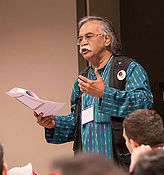
Indu Prakash Singh
Homelessness to Homefulness? Building a Network for Shelter in Delhi, India
Indu Prakash Singh is a human rights defender, poet, author, feminist and a PRA / PLA practitioner and facilitator. He is currently the Leader of the Urban Knowledge Activist Hub (Citizens’ Rights Collective – CiRiC) of Action Aid India. Indu is known for his path-breaking work with people experiencing homelessness (CityMakers), in India, since 1999.
Indu’s 5th book is on CityMakers: Tribulations & Triumphs – A Saga of Historic Struggle of the Homeless Residents of India (2017 & 2016). Indu is an author of four books on women’s issues: Women’s Oppression, Men Responsible (1988); Women, Law and Social Change in India (1989 & 2016); Indian Women: The Captured Beings (1990); Indian Women: The Power Trapped (1990). Indu has won many awards, such as CNN- IBN’s “Citizen Journalist Award” and “Person of the Year, 2003” of First City.
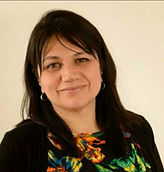
Karinna Soto
Lunchtime plenary
Karinna Soto is the founder of Fundación CalleLink – a Chilean social movement that promotes recognition of the human rights of people experiencing homelessness, designed and implemented in the Chilean government’s first social policy for homelessness. She is the co-author of the book “En Chile Todos Contamos, 2nd Cadastre of People in a Street Situation in Chile” and a member of the board of “Nuestra Casa”, which assisted over 500 adults experiencing homelessness in rebuilding their lives. She is currently the executive director of the Fundación Colunga, a social investment fund for Latin America.
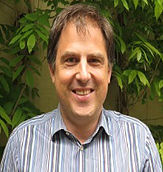
Freek Spinnewijn
Counting homelessness across contexts; Migration and homelessness
Freek Spinnewijn has been the Director of the European Federation of National Organisations Working with the Homeless (FEANTSA) since 2001. FEANTSA is the only European NGO exclusively working on the issues of homelessness and housing exclusion. Prior to joining FEANTSA, Freek was the Director of the European Platform of Associations of Older People (EPSO). Freek sits on the board of the Housing First Europe Hub, the European Public Health Alliance (EPHA), the European Anti-Poverty Network (EAPN), and Social Services Europe (SSE). He is a member of the advisory group of the World Habitat Award (BSHF) and a member of the board of the Venture Philanthropy Fund of the King Baudouin Foundation (Belgium).
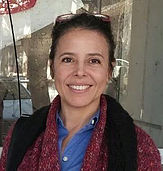
Alexia Suarez
IGH Global Framework of Homelessness in Argentina, Brazil, and Puerto Rico
Alexia is a researcher and lecturer at the University of Puerto Rico-Cayey and the University of Alcala (Madrid) – Institute of Latin-American Studies (IELAT), specializing on homelessness, gender, human development and social inclusion. Among her work is the first research on Female Homelessness in Latin America and the Caribbean in Puerto Rico – expanded to Nicaragua with the partnership of the IELAT and the National Autonomous University of Nicaragua (UNAN). She collaborates with Puerto Rico to conduct their Point in Time Counts (PIT) and conducted the first PIT in Nicaragua, at the City of Leon, with the affiliation of the UNAN & IELAT.
She is the Director of Proyectos FELICIDAD – an NGO dedicated to integrating the academia, good practices and public policies related to homelessness and gender equality, a participant of the Homeless Continuum of Care System of Puerto Rico and the San Juan Homelessness Coalition. “FELICIDAD” means “happiness” in Spanish and is an acronym for our values: Strength, Equality, Liberty, Inclusion, Compassion, Independence, Rights, Joy, and Development. The alliance and cooperation of representatives of other countries has fostered the Latin American and Caribbean Network on Homelessness (LACNH). With the support of the Institute of Global Homelessness (IGH), the LACNH held their first Summit on Homelessness at FIPE of the Sao Paulo University-Brazil. Alexia is committed to visualizing, humanizing, educating, and creating solutions to end homelessness and gender inequality. Alexia also represented the Latin American and Caribbean Region on the 2016 HABITAT III Forum: “Providing Adequate Housing for All: Defining, Measuring, and Ending Homelessness”.
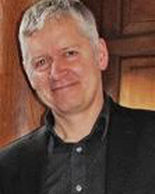
Jeremy Swain
Begging and panhandling
Jeremy Swain began working with people experiencing homelessness as a volunteer and progressed through a variety of paid roles to eventually become CEO of Thames Reach, which provides a range of services in London to over 7,000 people experiencing homelessness every year. He is a member of the London Mayor’s ‘No Nights Sleeping Rough’ Task Force and a Board trustee of Homeless Link – the umbrella body for homelessness organizations in England.
He is a regular commentator on radio and TV on homelessness issues and an influential magazine columnist. In 2017, Jeremy received a City Lit Lifetime Fellowship Award for his commitment to adult education in the United Kingdom.

Harry Tan
Legal and enforcement issues
Harry Tan is a PhD candidate with Monash University, Australia. His current PhD research is an ethnographic study of how older people in Singapore become, experience and exit homelessness. Harry has previously done research on street children in Bangkok, Thailand and street busking in Singapore.
As a volunteer, Harry has worked closely with people experiencing homelessness in Singapore since 2012, and in Melbourne since 2015. Harry has also expanded his volunteering work to include people with mental and addiction issues in Singapore.
Aslan Tanekenov
Migration and homelessness
Aslan Tanekenov is Associate Professor at the Kazakh-British Technical University in Almaty, Kazakhstan. He obtained his PhD degree in the U.K. in 2013. For more than 10 years, Aslan worked as a consultant in various projects of the United States Agency for International Development (USAID), U.S.A., and the Department for International Development (DFID), U.K., which funded homelessness and people with disabilities’ NGOs in Kazakhstan. Aslan also was a researcher at a governmental think tank institution. He made overseas exchange of experience visits to Bangladesh, Hungary and Russia.
Aslan Tanekenov obtained his Master’s degree from the University of Glasgow, U.K., and completed post-graduate cross-sector partnership training at the University of Cambridge, U.K. He was awarded the British Foreign and Commonwealth Office Chevening Award in 2001 and the Kazakh Government’s ‘Bolashak’ Award in 2009.

Lígia Teixeira
Solutions Showcase
Lígia Teixeira is Head of Research and Evaluation at Crisis, where she leads on the design and delivery of one of the largest programs of research and evaluation on issues related to housing and homelessness in the UK. She also leads on a major project to create a new Centre for Homelessness Impact to champion the use of evidence in policy and practice. As part of this work, she published Ending Homelessness Faster by Focusing on What Works earlier in the year.
Lígia joined the charity in March 2008, following stints at the Young Foundation and the Refugee Council. She was awarded a PhD from the Government Department of the London School of Economics in 2007. She has also worked in research roles for Professor David Held, founder of Polity Press, for sociologist Professor Helmut Anheier, who founded and directed the LSE’s Centre for Civil Society, and for the International Labour Organisation where she covered issues including human trafficking, child labour and women’s rights. Lígia is a 2016 Clore Fellow, having been awarded the Specialist Fellowship on Housing and Homelessness, funded by the Oak Foundation.

Sanna Tiivola
Defining an end to homelessness
Sanna Tiivola is an executive manager of a national NGO called No Fixed Abode. No Fixed Abode was founded by people experiencing homelessness 30 years ago. The organization aims to influence Finnish housing policies to get rid of shelters and make it possible for everyone to live in his or her own apartment. They have a long history of participation and peer support work done by people experiencing homelessness. No Fixed Abode has been involved in the Finnish government’s homelessness programs since 2001. The organization founded the very first housing first unit for men experiencing long-term homelessness 2007.
Sanna Tiivola has been working in the homelessness sector for 20 years and has been a member of the Finnish government’s steering group for homelessness programs. She has also been a member of the European Federation of National Organizations working with the Homeless (FEANTSA) participation working group since 2007.
She is a Social Educator – with a Bachelor of Art (director of theatre expressions) from Metropolia University of Applied Sciences, studying to became a Master of Culture and Arts from Turku University of Applied Sciences. She has been emphazing the participation of people experiencing homelessness in every level of the decision making prosesses.
Sebastián Zulueta
Migration and homelessness
Sebastián Zulueta is the Executive Director of América Solidaria Internacional – an international NGO that works to overcome child poverty in North and South America through creating a volunteer network that builds capacity in communities. América Solidaria targets its work in the areas where child poverty is most intense: child homelessness and child labor; migrant, displaced and/or refugee children; and children of disadvantaged backgrounds. América Solidaria is aiming to develop a continental homelessness volunteer network, capable of sharing knowledge and good practices, and giving a sense of unity to the efforts across the continent in overcoming homelessness.
Sebastián is committed to social transformation as a means to overcoming poverty and inequality. He previously worked as the Executive Director of Nuestra Casa Foundation – a foundation that provides assistance to people experiencing homelessness. He also led a Service Learning movement in Chile and served as a professor of volunteerism at the Pontificia Universidad Católica de Chile. Currently, Sebastián works in the International Cooperation.
This conference is supported by a grant from The Chicago Community Trust.

Ending Street Homelessness in Your City is the second biennial conference of the Institute of Global Homelessness (IGH). By invitation only, the event will convene leaders with a country-level, regional or global perspective on homelessness in Chicago from June 5 – 6, 2017. Attendees will return home with the tools necessary to drive toward an end to street homelessness:
- A clear vision of what an end to street homelessness looks like;
- Strategies for measuring progress; and
- Approaches to the most difficult political and practical challenges cities face in achieving this goal.
agenda at a glance
Note: agenda is subject to change.
Monday, June 5
8:00 – 9:00 AM | REGISTRATION & CONTINENTAL BREAKFAST
9:00 – 9:45 AM | OPENING PLENARY
English-Spanish translation available.
0:00 – 11:30 AM | SIMULTANEOUS PANELS
Defining an end to homelessness
Presenters will discuss how national efforts to end homelessness in Canada, the USA and Finland developed and operationalized definitions of success, with attention to lessons learned.
Using measurement and data to end homelessness
This session will have English-Spanish translation.
Panelists will discuss the role of measurement as part of a successful effort to end homelessness. Hear perspectives from Chicago, USA; Montevideo, Uruguay; and from a cross-European measurement initiative.
11:45 – 12:15 PM | LUNCHTIME PLENARY & KEYNOTE
12:30 – 1:30 PM | LUNCH & OPTIONAL LUNCHTIME WORKSHOP
1:45 – 3:15 PM | SIMULTANEOUS PANELS
Counting homelessness across contexts
This session will have English-Spanish translation.
This session will examine methods to measure homelessness in a variety of cultural and economic contexts.
Strategies to address encampments
This session will share lessons for addressing homelessness among people living in encampments. Presenters will share context and lessons learned from the USA, with a special focus on an encampment resolution approach in San Francisco, and from the United Kingdom.
3:30 – 5:00 PM | SIMULTANEOUS PANELS
Migration and homelessness
This session will have English-Spanish translation.
Speakers will address homelessness among cross-country migrants in South America; internal migrants in Kazakhstan; and asylum-seekers in Europe. Discussion will surface common challenges across these contexts and any promising approaches.
Legal and enforcement issues
This session will examine questions related to engaging law enforcement in efforts to end street homelessness and will consider homelessness and legal issues broadly.
5:00 – 7:00 PM | RECEPTION & HAPPY HOUR
Tuesday, June 6
8:00 – 9:00 AM | CONTINENTAL BREAKFAST
9:00 – 10:30 AM | SIMULTANEOUS PANELS
English-Spanish translation available.
Begging and panhandling
This session will have English-Spanish translation.
This session will examine the nature of begging in different contexts, including how begging interacts with public perception, outreach work and efforts to address homelessness.
Solutions Showcase
This session will explore a series of projects, campaigns or innovations related to ending street homelessness through short 5 – 10 minute presentations. Our goal is to offer enough of an introduction for you to identify presenters you would like to connect with at lunch to learn more.
10:45 – 11:45 AM | LUNCHTIME PLENARY & KEYNOTE
This session will have English-Spanish translation.
12:00 – 12:45 PM | LUNCH
1:00 – 1:45 PM | SIMULTANEOUS PRESENTATIONS
Attendees will have the choice to join one of the following presentations with a smaller group of peers during a conference “speed round” that is half the length of our other workshops:
Using Housing First to End UK Street Homelessness: Opportunities and Challenges
Nicholas Pleace, FEANTSA
Tackling Homelessness in India with Grace, Dignity, Rights and Equity
Indu Prakash Singh, Action Aid India and Mrinalini Ravi, The Banyan
Is your local community the answer to ending hidden homelessness? The Nightstop model of addressing hidden homelessness in the UK
Martin Houghton-Brown, Depaul UK
IGH Global Framework of Homelessness in Argentina, Brazil, and Puerto Rico
This session will have English-Spanish translation.
Griselda Palleres, Universidad de Buenos Aires; Silvia Schor, University of São Paulo; Alexia Suarez, Proyectos FELICIDAD-University of Puerto Rico
2:00 – 3:30 PM | WORKING SESSIONS
This time has been reserved for working sessions around specific topic areas as proposed and organized by attendees.
3:45 – 4:30 PM | KEY LESSONS & NEXT STEPS
Attendees will break into separate rooms for facilitated conversation about how they will use strategies from the conference when they return home, and what our next steps should be as a global movement.
4:45 – 5:00 PM | WRAP UP & FAREWELL
The conference will conclude with remarks by IGH Advisory Committee Chair Dame Louise Casey.
Ending Street Homelessness in Your City, IGH’s second biennial conference, took place in Chicago from June 5 – 6, 2017. The event brought together 115 thought leaders from 30 countries and touched on what it means to end street homelessness, how to measure progress, and how to solve some of the most complicated challenges cities face in meeting this goal.
To those who attended, thank you for your contributions. To those who were unable to join us, we hope the resources available here will help you feel like you were there!
Opening Plenary
Using measurement and data to end homelessness
Panelists Mayra Aldama, Kimberly Schmitt and Volker Busch-Geertsema discussed the role of measurement as part of a successful effort to end homelessness. They provided perspectives from the city level in Chicago, USA; Montevideo, Uruguay; and on the role of street homelessness in measuring homelessness in Europe.
Defining an end to homelessness
This session set the context for measurement of homelessness on a global scale. The speakers discussed how national efforts to end homelessness in Canada, the USA and Finland developed and operationalized definitions
of success, with attention to lessons learned.
Plenary: Ending Homelessness in Chicago
CEO of All Chicago Nonie Brennan and Keynote Lisa Morrison Butler, Commissioner of the Chicago Department of Family and Support Services, discussed the state of homelessness in the city of Chicago.
Using real-time data to end homelessness
During this workshop, Jessica Marcus of Community Solutions introduced the concept of real-time data, and
why it matters in efforts to end homelessness. Attendees learned tips for collecting and using real-time data.
Counting homelessness across contexts
Presenters in this session examined methods to measure homelessness in a variety of cultural and economic contexts. Learn about inclusion of people experiencing homelessness in the 2017 Chilean census; integration of questions related to homelessness by Eurostat, the European Union’s statistical office; and an effort to estimate the number of children experiencing homelessness in seven cities in Cambodia.
-
- Chilean Experience: Counting Homelessness Across Contexts – Isabel Lacalle
- Data Collection on Homelessness in EU: Recent Eurostat Initiative Explained – Freek Spinnewijn
- Estimating the Number and Characteristics of Homeless Children Across Seven Cities in Cambodia – Beth Rubenstein
- Estimating the Size of the Homeless Adolescent Population Across Seven Cities in Cambodia – study by Beth Rubenstein
Strategies to address encampments
This session shared lessons for addressing homelessness among people living in encampments. Presenters shared context and lessons learned from the USA, with a special focus on an encampment resolution approach in San Francisco, and from the United Kingdom.
Migration and homelessness
This international panel addressed homelessness among cross-country migrants in South America; internal migrants in Kazakhstan; and asylum-seekers in Europe. Discussion surfaced common challenges across these contexts and any promising approaches.
Legal and enforcement issues
This session examined questions related to engaging law enforcement in efforts to end street homelessness and considered homelessness and legal issues broadly.
Begging and panhandling
This session examined the nature of begging in different contexts, including how begging interacts with public perception, outreach work and efforts to address homelessness.
Solutions Showcase
This session explored a series of projects, campaigns or innovations related to ending street homelessness through short presentations.
- Airbnb & SF Giants Campaign – Kristen Berlacher
- Ending Homelessness Better By Focusing on What Works – Ligia Teixeira
- Sharing Experiences From the European End Street Homelessness Campaign – Isobel Ashford and Lee Buss
- Ending homelessness faster by focusing on ‘what works’ – study by Ligia Teixeira
- The next big thing in preventing and tackling homelessness – blog by Ligia Teixeira
Plenary
The Latin American Network on Homelessness presented about the work that they are doing with redLAC, and IGH board member and President of Community Solutions Rosanne Haggerty spoke about the need for building coalitions and honesty in work to end homelessness.
Using Housing First to End UK Street Homelessness:
Opportunities and Challenges
This workshop explored the opportunities and challenges surrounding the housing first approach as a strategy to end street homelessness in the United Kingdom (UK).
Tackling Homelessness in India with Grace, Dignity, Rights and Equity
This workshop unpacked information about the experience of homelessness across India, including defining homelessness in the country, discussing factors that play a role in one experiencing homelessness, and exploring initiatives in place to solve the issue.
Is your local community the answer to to ending hidden homelessness? The Nightstop model of addressing hidden homelessness in the UK
During this workshop, the CEO of Depaul UK discussed the Nightstop program, an initiative to prevent young people in the United Kingdom from experiencing homelessness through community hosting.
IGH Global Framework of Homelessness in Argentina, Brazil and Puerto Rico
This workshop examined how the IGH Global Framework can be applied to homelessness in Argentina, Brazil, and Puerto Rico. The analysis included definitions of categories and subcategories of homelessness in accordance to the framework, methodology of measuring homelessness in those countries, and policies and practices in place.




